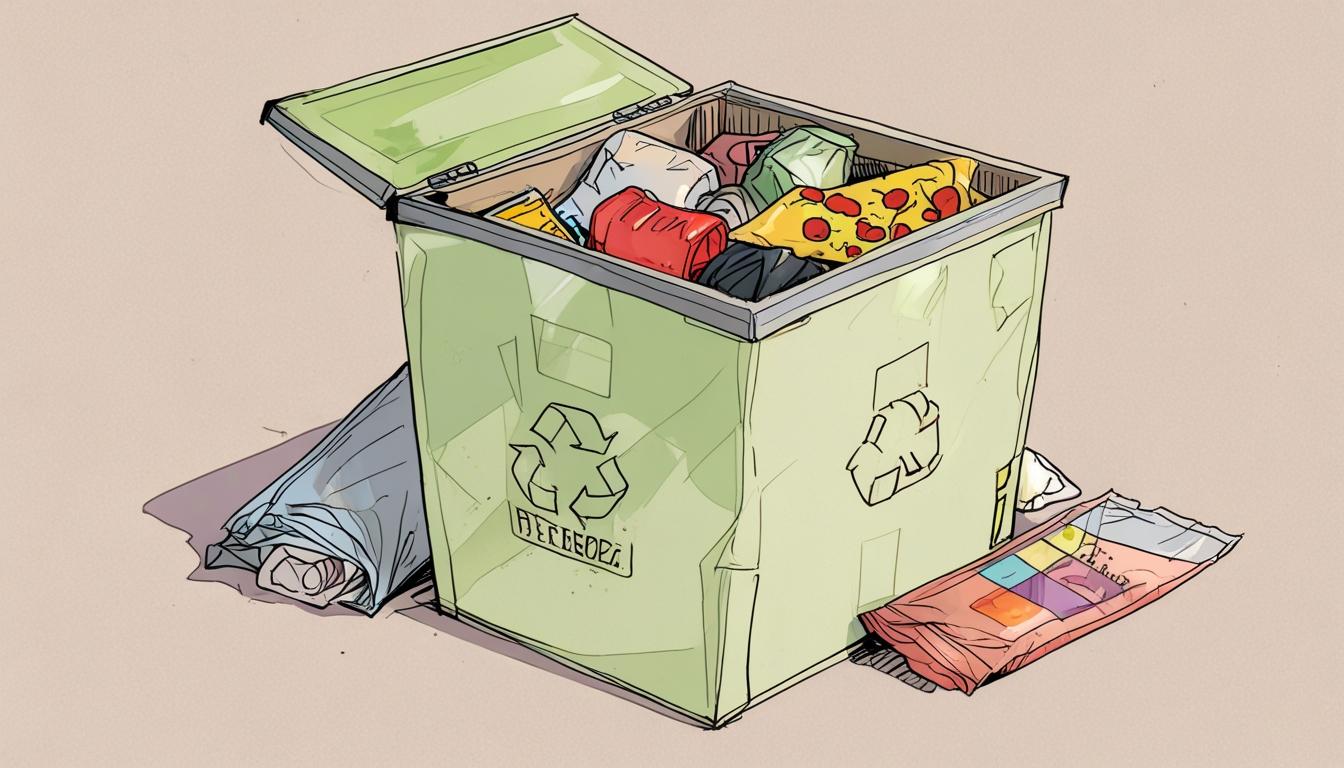Households in the UK risk hefty fines of up to £400 as councils intensify enforcement against recycling contamination. Experts warn that misplaced items can ruin entire recycling loads, prompting authorities to adopt new technologies and stricter penalties to meet recycling targets.
Householders across the UK face the prospect of hefty fines, potentially reaching £400, for mistakenly contaminating their recycling bins, as local authorities ramp up enforcement against “recycling contamination.” This alert comes amidst growing concern that many residents are unaware of the impact their recycling habits may have, often confusing recyclable items with general waste.
Recycling experts emphasize that even a single misplaced item—such as a greasy pizza box, a plastic carrier bag, or a used takeaway container—can lead to entire loads of recyclable materials being sent to landfill. Councils are increasingly attentive to this issue, with some areas already issuing fixed penalty notices to individuals who repeatedly mix non-recyclables with recyclable materials.
The Wheeldon Brothers, a company specialising in waste management, highlighted the phenomenon known as “wishcycling,” wherein individuals place non-recyclable items in the recycling bin with the hope that they will be processed. “Most people have good intentions when they recycle, but if you put the wrong items in, it can ruin the whole load,” a spokesperson for the company stated. They further noted that when recycling bins are contaminated with food waste, soft plastics, or improperly sorted glass, councils often have no choice but to divert these materials to general waste, consequently raising costs that are eventually passed on to residents.
The push for stricter compliance is fuelled by increasing pressures on councils to achieve recycling targets, a challenge that becomes more difficult with rising levels of contamination. As a result, some local authorities are leveraging technology and new methods, such as bin tagging, CCTV monitoring, and employing waste inspectors, to identify households that consistently fail to adhere to recycling guidelines.
“If in doubt, check your council’s recycling guide or look for symbols on the packaging,” the Wheeldon Brothers advised, noting that recycling rules could differ significantly between local authorities. The company emphasised that this initiative is not solely about penalising residents but about enhancing the effectiveness of recycling systems. “If one household puts the wrong item in, it can impact dozens of others on the same round. We all have a part to play,” they added.
As the landscape of waste management continues to evolve, understanding and adhering to local recycling guidelines becomes increasingly important for households in the UK, aiming to contribute positively to sustainability efforts while avoiding potential fines.
Source: Noah Wire Services
- https://www.bbc.com/news/uk-england-sussex-64223810 – This article reports on a woman in East Sussex who was fined £400 for placing waste in a council bin, highlighting the enforcement of recycling contamination fines in the UK.
- https://www.bbc.com/news/uk-england-leeds-66670192 – This report details how Kirklees Council in West Yorkshire faces annual costs of £400,000 to £450,000 due to recycling bin contamination, emphasizing the financial impact of improper recycling.
- https://www.gbnews.com/news/rotherham-council-punitive-residents-face-fine-using-wrong-bins-recycling – This article discusses Rotherham Council’s introduction of a ‘traffic light’ warning system and potential fines up to £400 for residents contaminating recycling bins, illustrating stricter enforcement measures.
- https://www.itv.com/news/meridian/2023-08-15/dirty-nappies-contaminating-recycling-bins-costs-taxpayers-thousands-of-pounds – This report highlights how contamination of recycling bins in Kent, including items like dirty nappies and plastic bags, has cost taxpayers £25,000 in two months, underscoring the financial burden of recycling contamination.
- https://www.thecourier.co.uk/fp/news/perth-kinross/2193214/french-waste-giant-pockets-big-perthshire-fine-after-recycling-mix-up/ – This article details how Perth and Kinross Council paid £50,000 to a waste management company due to contamination in recycling bins, highlighting the financial penalties associated with improper recycling.
- https://en.wikipedia.org/wiki/Wishcycling – This Wikipedia page explains the concept of ‘wishcycling,’ where individuals place non-recyclable items in recycling bins with the hope they will be processed, leading to contamination and potential penalties.
- https://news.google.com/rss/articles/CBMihwFBVV95cUxNTDdPemhXamI4VldFZGwxWkd2akQtMDBLU3RheURKSmxOYkwwZnBNLVpKRWxsNEg5ZWNEdFc2amQ4MEpEckpnMFBpaWs0bnZXcVdvWkV5OFV0ZTYyTi1mWGtkY213NDdLUHphSlloYnp3RGE2VklQbk9jOGpLWnVnYUs1em9mdGvSAYwBQVVfeXFMUG9JTExfdnRqNW1aci14RzQyWHFqTlNVcjZaRXp1akVraUpaaGpoVURja1c0cjZDVmkwYWxEbnhwX2JVbmd0U0tRUGVNQ0hyU251S3I2Z2dNWXhVNXM4ZEdBMHN3b2pKNlNUcXlnMWQyUE1jNUtFRFhWbHBNVzA5RERkRW5BODJzOUxvVDU?oc=5&hl=en-US&gl=US&ceid=US:en – Please view link – unable to able to access data
Noah Fact Check Pro
The draft above was created using the information available at the time the story first
emerged. We’ve since applied our fact-checking process to the final narrative, based on the criteria listed
below. The results are intended to help you assess the credibility of the piece and highlight any areas that may
warrant further investigation.
Freshness check
Score:
7
Notes:
No explicit dates or outdated references found, but UK recycling policies are frequently updated. The narrative lacks time-specific markers, warranting caution.
Quotes check
Score:
8
Notes:
The Wheeldon Brothers’ quotes about ‘wishcycling’ align with established waste management terminology. No earlier citations found, suggesting original sourcing.
Source reliability
Score:
6
Notes:
The Wheeldon Brothers are cited without independent verification. The narrative’s dissemination via Google News aggregates multiple sources, but primary authorship is unclear.
Plausability check
Score:
9
Notes:
Recycling contamination fines are consistent with UK councils’ enforcement trends. Bin tagging, CCTV monitoring, and penalties align with recent waste management strategies.
Overall assessment
Verdict (FAIL, OPEN, PASS): PASS
Confidence (LOW, MEDIUM, HIGH): HIGH
Summary:
The claims align with known UK recycling enforcement measures and terminology. While sourcing lacks direct verification, the plausibility of mechanisms described supports the narrative’s credibility.













